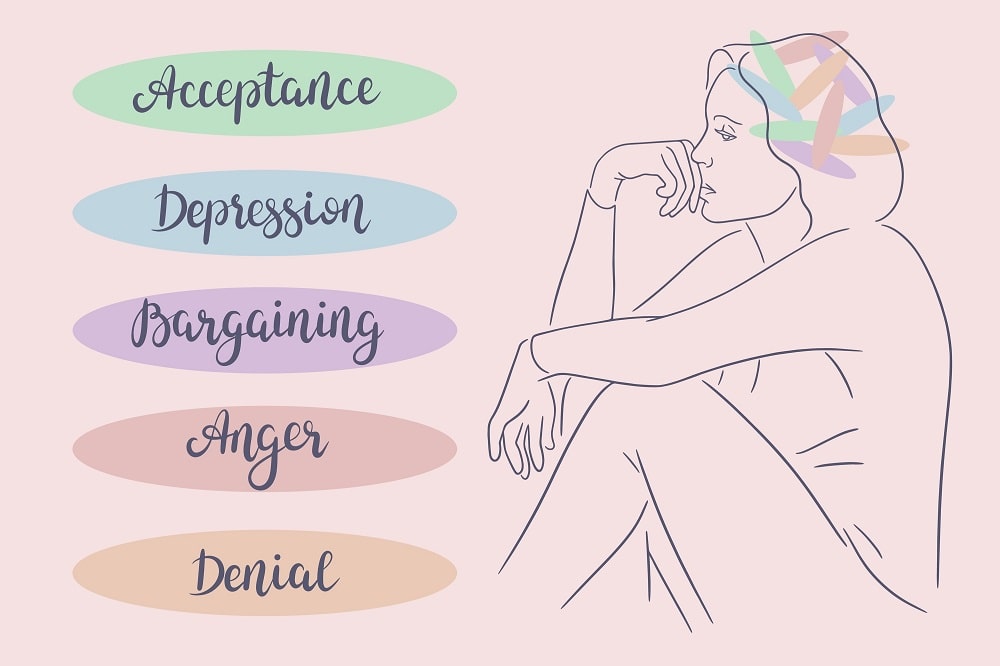Have you heard about the five stages of grief?
You may have heard about the five stages of grief, but like many, it may have been a passing idea. Despite this, these are a great aid when it comes to grieving and managing to go through such a loss, be it that you are dealing with one now or you know someone who is.
They have been observed by experts, and they are stages through which everyone goes, but they are not going to be the same for everyone.
Whether you are preparing for the loss of someone important to you (due to illness or old age) or you know someone who has recently lost a loved one, it is good to know these stages so you can process your grief or help someone through their own.
Keep in mind that there are other types of feelings that could come up during any sort of grieving (be it death or breakup), but these are the most common ones that you can easily recognize and feel.
Do not try to ignore your grief, as the best way to cope and heal after a loss is to feel and go through all the stages your mind and body experience.
Are you ready to know more about the stages of grief? Keep on reading to discover them and what particularities they each hold.

What are they?
Psychiatrist Elisabeth Kübler-Ross has developed these five stages of grief after observing how people deal with the loss of a loved one.
Her observations and theorizing afterward have come up with the distinct five stages of grief as we know them now, which are denial, anger, bargaining, depression, and acceptance.
While they may sound simple and straightforward, the way people experience these emotions is not linear, and sometimes not even in the same order or in the same amount of time. Grieving is a personal experience for everyone, and you should never compare yourself with others on this matter.
What’s more, the lines between the stages can oftentimes be blurred, and you can find yourself moving from one stage to another very fast, or back to a stage you thought had passed, and even experiencing two of them simultaneously.
There is no “true” or “correct” way to grieve, so never be harsh on yourself while going through this difficult time in your life.
Keep on reading to discover what each of the stages of grief could look like for you or a loved one!
Stage 1: Denial
This is not to say that people who go through the first stage of grief are denying the absence of someone, but rather that they could experience a denial of the feeling of loss.
The denial stage is not about denying reality but about learning how to cope with the overwhelming pain and emotions that come after losing someone. Reality is suddenly really different, and everyone is trying their best to cope with the emotions that come along when it may seem even fake that they are gone.
Since the mind may have a hard time adjusting to its new normal where that loved one or important person no longer exists in your life, it may take a while for it to happen.
That is when denial appears, and it helps slow the mind, giving it more time to process the information, memories, and imagery of the person who was just lost.
Denial is about taking things one step at a time, instead of suddenly trying to be okay with such a significant loss and overwhelming your entire system.

Stage 2: Anger
Once you have managed to process the information in your own time, the next stage that you will be faced with is anger.
The adjustment to the new reality and understanding of it comes along with emotional discomfort, which, no matter how tremendous, is hard to deal with.
The emotional outlet for emotional discomfort is often anger because it is the easiest one to conjure and it surrounds you with a shield of some sort
Anger is one of the emotions that does not give the impression of vulnerability.
In the case of loss and grief, many people are not prepared to admit that they are scared and, at times, even extremely sad about what happened. They may even perceive that it is not socially acceptable to say that, so they resort to anger.
Anger in times of loss allows people to express themselves, yet it can also be isolating. At times, it is the first emotion we feel when dealing with the emotions of loss, but it can also make others around us reluctant to approach us.
Everyone grieves in different ways, but a lot of people may benefit from reassurance, comfort, and connection from loved ones who understand them, and the anger stage may be a wall to climb before they accept these more pleasant feelings.
Stage 3: Bargaining
The third stage is called bargaining because, more often than not, people who reach this stage find themselves willing to do anything to get rid of the pain of losing someone.
They may say and promise anything in order to minimize or alleviate the pain they feel, even if it is not possible.
A lot of people turn to a higher power or the universe, trying to bargain with them in order to get the person back, despite being aware it is not possible.
The bargaining stage is representative of the moment when people become extremely aware of their and their loved ones’s humanness; one thing is certain in life, and that is death, and no matter what we can do, we can change something like this.
of helplessness closely associated with this stage, as everything feels out of control. People end up focusing on what they have said and done in the days leading up to the event, going as far as to blame themselves even when it is not the case.
Mean words and actions are recalled, along with the idea and belief that if something changed in our attitude, things would have played out differently or we would not be in such emotional pain.
Unfortunately, such assumptions are drastic and just part of the bargaining phase, since coming to terms with others and our own mortality is hard.

Stage 4: Depression
The fourth stage of grief starts to set in when our mind and imagination end up settling and calming down when we have managed to process a bit more and can look at our present and reality.
Bargaining is no longer something we can use to deal with our emotions, so we have to face the music.
Depression generally sets in as we deal with grief since that is when we feel the loss more acutely than before. No longer are we in an emotional brain fog, no more acting instinctively out of panic; thinking clearly means that we have come to terms with the loss, and it is unavoidable now.
Many people who have gone through such a significant event end up closing into themselves due to the sadness they feel; they become less sociable and less likely to reach out socially and discuss how they feel, retracting from others.
While it is a natural way of grieving, depression caused by the loss of someone is one of the most difficult-to-process stages of grief and also the most isolating. Learn the signs and know that asking for help is always an option, be it from a professional or a close friend or family member.
Stage 5: Acceptance
The last of the stages of grief is acceptance. Once we have taken the time and experienced all the other stages, we will reach a place of acceptance. Yet, keep in mind that acceptance is not the absence of pain or loss.
It is an acceptance of our new reality and a peace made with the idea that this is what has happened; the stages of grief are sometimes about not being able to accept the reality, trying to make it something different, and coming to terms with everything.
You may still feel emotions like regret and sadness and even experience depressive episodes, but nothing like the ones in the stages before. The denial, anger, and bargaining stages are survival tactics, and once reaching the acceptance phase, they are likely to not return.
Read more about these grief stages in Elisabeth Kübler-Ross and David Kessler’s book: On Grief and Grieving.
Grief and all its stages can take a toll on your mental and physical health, so make sure you are well-equipped to deal with them. Yet, they are not the only stages that can affect your physical health in a bad way. Stress is one of the biggest criminals when it comes to this! If you are curious about how stress affects the body, read more about it here!














